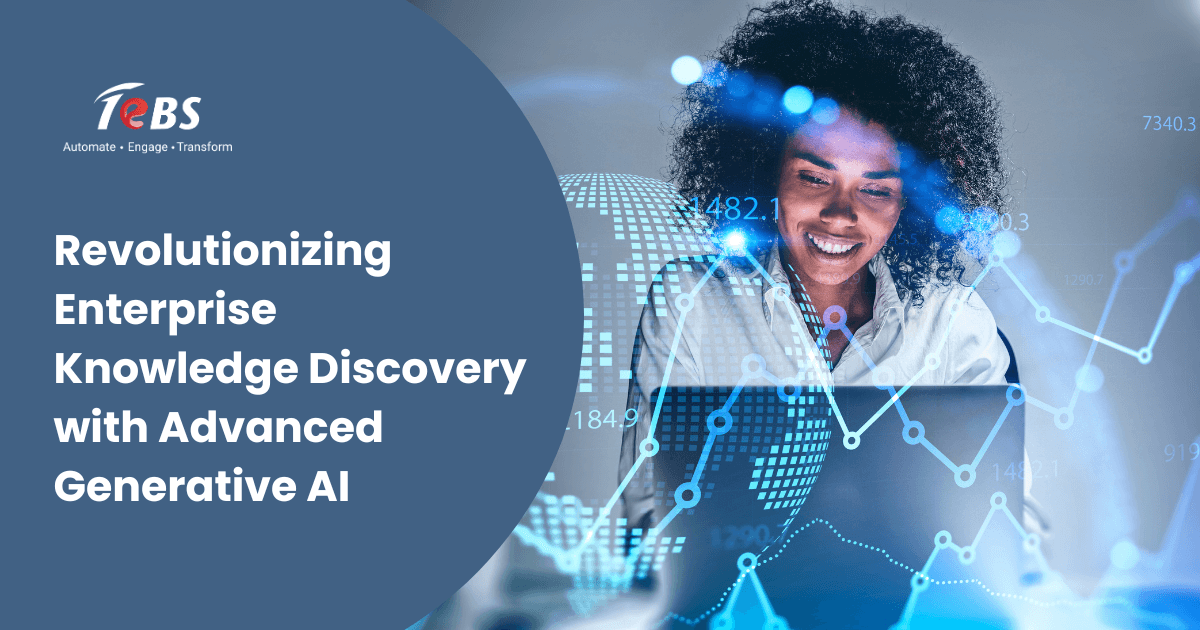Enterprises, both large and small, grapple with the challenge of efficiently accessing, extracting, and utilizing their vast troves of information. In today’s dynamic business environment, staying ahead relies on effectively tapping into knowledge resources. This is where the Advanced Generative AI-based Enterprise Knowledge Discovery Solution comes into play, transforming the way businesses uncover, utilize, and generate valuable insights.
What is Enterprise Knowledge Discovery?
Enterprise Knowledge Discovery is the process of extracting valuable insights, information, and intelligence from the vast repository of knowledge assets within an organization. These knowledge assets include documents, databases, emails, internal portals, and more. Traditionally, this process has been time-consuming and labor-intensive, often requiring specialized skills and knowledge of complex search queries. However, with the advent of Advanced Generative AI, this landscape is rapidly changing.
How is it Used in Industry?
In the modern business landscape, Enterprise Knowledge Discovery is no longer a luxury but a necessity. Organizations across industries, from healthcare to finance, are turning to this innovative solution to streamline their operations and stay ahead in the competitive market.
Here are some keyways in which Enterprise Knowledge Discovery is being harnessed:
Intuitive Querying: The Discovery Engine within this solution allows users to interact with their data using natural language queries. Users can input their questions, prompts, or search criteria in a conversational manner, without needing to be experts in complex search syntax. This natural language interface significantly enhances user-friendliness and accessibility.
Semantic Understanding: The heart of this AI-driven solution lies in its ability to understand the meaning, context, and semantic relationships between words and concepts. This goes beyond simple keyword matching; it ensures that the information retrieved is not just relevant but contextually accurate, greatly enhancing the quality of insights.
Multi-Source Integration: In today’s multifaceted digital landscape, data is scattered across various sources like SharePoint, emails, file systems, team collaboration tools, and internal portals. The solution seamlessly integrates with these sources, providing users with a unified platform to access information from diverse repositories. This consolidation eliminates the need to toggle between different interfaces, saving valuable time and effort.
Optimized Search Journey: The Advanced Generative AI ensures that users can swiftly and effortlessly find the information they need. By considering context and user intent, the solution streamlines the search journey, delivering precise results quickly. This optimization empowers employees to make informed decisions, drive innovation, and enhance productivity.
AI-Enabled Use Cases for Enterprise Knowledge Discovery
Automated Document Summarization: AI can be used to automatically generate concise summaries of lengthy documents, making it easier for users to quickly grasp the key insights and information within reports, research papers, and other documents.
Content Recommendation: AI algorithms can analyze user behavior and preferences to recommend relevant documents, articles, or resources, helping employees stay updated with the latest information and insights in their field.
Data Classification and Tagging: Machine learning models can automatically classify and tag documents and data, making it easier to organize and search for information within the enterprise knowledge repository. This helps in maintaining data integrity and compliance.
Anomaly Detection: AI can identify unusual patterns or outliers within the data, which could indicate errors, security breaches, or emerging trends. This is especially valuable for ensuring data quality and security.
Predictive Analytics: AI can analyze historical data and provide predictive insights, helping organizations make data-driven decisions. For example, it can predict future market trends, customer behavior, or operational issues based on past data.
Natural Language Processing (NLP) for Sentiment Analysis: NLP techniques can be applied to analyze text data, such as customer feedback or social media mentions, to gauge sentiment. This information can be valuable for improving products, services, and customer relations.
Collaborative Filtering: AI-driven collaborative filtering algorithms can assist in recommending relevant knowledge resources to users based on the preferences and behavior of similar users within the organization.
Personalized Knowledge Portals: AI can help create personalized knowledge portals for employees, tailoring content and resources to individual roles, interests, and needs, thereby enhancing productivity and efficiency.
Content Generation: As mentioned earlier, AI can be used not only for knowledge discovery but also for generating content such as reports, proposals, and email templates, leveraging existing knowledge assets.
Data Visualization and Exploration: AI-powered data visualization tools can help users explore and understand complex datasets through interactive visualizations, enabling better decision-making.
Automated Language Translation: In global organizations, AI can assist in translating knowledge assets and documents into multiple languages, breaking down language barriers and facilitating cross-border collaboration.
Compliance and Regulatory Tracking: AI can monitor and track changes in regulations and compliance requirements, ensuring that the organization remains up to date and compliant with evolving legal standards.
Keyword Extraction: AI algorithms can automatically identify and extract key terms and concepts from documents, simplifying the process of tagging and categorizing information.
These AI-enabled use cases not only enhance knowledge discovery but also contribute to the overall efficiency, effectiveness, and competitiveness of enterprises by leveraging the power of artificial intelligence to extract actionable insights and streamline decision-making processes.
How TeBS can help
TeBS plays a pivotal role in assisting customers by offering a comprehensive spectrum of technology expertise and IT services, to harness the capabilities of AI.
We offer consulting services across Process Discovery, Opportunity Assessment, Intelligent Automation Business Case development, Feasibility Studies, Proof of Concept (POC), Proof of Value (POV), and AI/ML/GenAI Ideation Workshops. With TeBS by your side, you’ll uncover hidden efficiencies, make informed decisions, validate innovative ideas, and harness the power of cutting-edge technologies.
In conclusion, the Advanced Generative AI-based Enterprise Knowledge Discovery Solution is a game-changer for businesses seeking to unlock the full potential of their data. It provides a holistic approach to knowledge management, making data accessible, actionable, and valuable. In an era where information is power, this solution empowers enterprises to stay competitive, make informed decisions, and drive innovation with ease. To know more about our Generative AI capabilities, mail us at [email protected]





